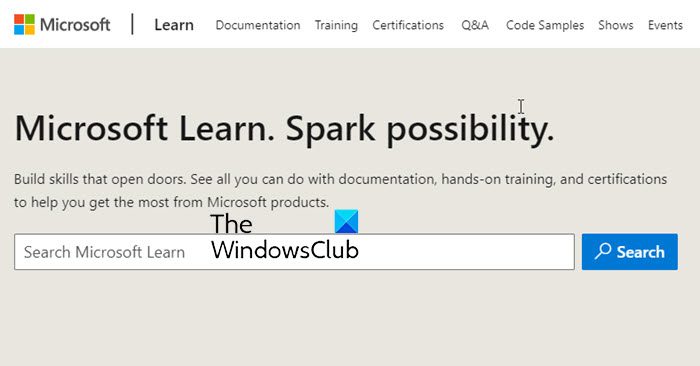Recently Microsoft announced that it will move its documentation from Docs to Learn subdomain. Microsoft Docs is a library of technical documentation for developers, end users, and IT Professionals. On Microsoft Docs, users get tutorials, guides, technical specifications, API references, code samples, and other information related to Microsoft software and services.

Microsoft to move its documentation from Docs to Learn
The users who use Microsoft Docs know that the documentation provided by Microsft can be accessed on docs.microsoft.com URL. But Microsoft Docs will no longer be available at this URL. Instead, Docs users can find the documentation at a different URL. However, for now, the old Docs URL is still active. When you click on the old URL, you will be redirected to the new Docs URL.
Microsoft Docs was introduced in 2016 as a replacement for MSDN and TechNet libraries. Some key events regarding the migration of content to Microsoft Docs are mentioned below:
- The documentation of Azure, Visual Studio 2017 RC, C++, ASP.NET Core, Entity Framework Core, and SQL on Linux was added to Microsoft Docs in 2016.
- In 2017, Microsoft moved Office SharePoint, Windows 10, Windows Server 2016, and BizTalk Server ITPro libraries to Docs.
- In 2018, Microsoft launched Microsoft Learn and moved the technical documentation of OneDrive from TechNet to Microsoft Docs.
- Now, in 2022, Microsoft is going to move its documentation from Docs to Learn.
Microsoft’s Erin Rifkin stated:
We’ve brought together all the technical content, learning tools, and resources that Microsoft has to offer in the new Microsoft Learn product family. Microsoft Learn is designed to help you get the most value from Microsoft products and services, so you can make the most impact through the work you want to do. Whether you’re innovating or troubleshooting a problem, technology, and the skills you need to use it are now within reach.
You can access documentation content at learn.microsoft.com/docs. The documentation available at this URL is organized in different categories, like .NET, Java, Azure, Microsoft 365, Office 365, Windows, Microsoft Teams, Gaming, and more.